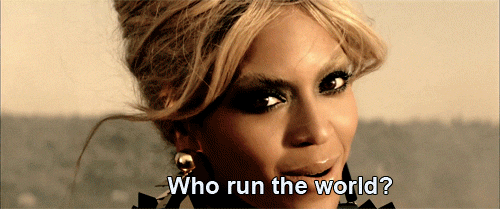Greetings, RLB readers. Today we’re going to examine the controversial practice of Feminism in Advertising.
This post was inspired by (not to be confused with sponsored by), what Business Insider is calling an Overtly Feminist ad from Pantene. I agree with that assessment. This ad is overtly feminist.
It is in fact so overtly feminist that it won’t air in the United States. Okay, no one has said that’s why it won’t be airing here, but I think we can all agree that isn’t much of a leap. The ad is for Pantene in the Philippines (shout out, S!), so it also features a refreshing cast of non-white women. Yes, they almost all look like models. This is a shampoo commercial, after all. The beautiful shiny shine shine hair is unavoidable.
Unsurprisingly, there are feminists who want advertisers to “stop using feminism” to sell things. Which is a viewpoint I can understand – taking an ideology that means so much to so many people and turning it into a tool for selling beauty products is a contentious move.
Here’s where we come to my However.
However, as a lifelong student of feminism and media literacy, I can’t help but see the good in ads like these. So is it right to draw a line, to say feminism is okay if you’re advertising a school, but not if you’re advertising shampoo?* What if you’re advertising Catholic school, when Catholicism isn’t exactly known for its progressive views on women?
Sidebar: One of my favorite jokes as a feminist, Catholic child was “What’s the highest rank a woman can have in the Catholic church?” Answer: “Nun.”
We live in a world that runs on capitalism. It isn’t my favorite thing about our world, and I will renounce corporate excess with the best of them. (Oh, look! Another However.) However, with this world of capitalism comes advertising. Quite often, with advertising comes raging sexism.
“Challenging the negative and amplifying the positive.”
Capitalism is a flawed system, but it can’t be denied that women are the driving force behind the global economy. Yet for a very long time we have been marginalized by the companies trying to sell us things. And let’s be honest. All of us (yes, even you) like having our things. According to the Harvard Business Review, their 2008 study found that women as consumers felt vastly underserved:
Although women control spending in most categories of consumer goods, too many businesses behave as if they had no say over purchasing decisions. Companies continue to offer them poorly conceived products and services and outdated marketing narratives that promote female stereotypes.
If that narrative is changing, and female stereotypes are being turned on their head by advertisers, why should it matter if the progress comes from advertising schools or shampoo or sports equipment or body lotion?
Advertising isn’t going away, and as Bloomberg contends:
The drum is beating ever-louder from economists, development experts and advocates who insist that women and girls are the key to nearly everything needed for a sustainable future, from global health to food security to economic growth.
Forbes is reporting, based on a McKinsey & Co. study, that “economies where women participate are more successful.” This is not a theory, but a reality supported by incontrovertible facts. The evidence is even hard to ignore in the eternal sausage-fest known as Hollywood.
So of course companies that are paying attention will be targeting women. If those companies can pander to us (and pander they will) with fewer of these ads and more of these ads, then I’m all for it.
My point of view isn’t new, and the naysayers provide a much-needed debate for how feminist ads can continue to improve. We will all benefit from more visible diversity in age, size, and color. (There are of course, the ones who do it really f*cking right.)
As advertisements continue to evolve and more of an effort is made to recognize the crucial role that women play in the international economy, I stand by the companies that shun this, and instead choose this or this or this.
*ps, is shampoo really a “beauty product”? isn’t it more about hygiene?


